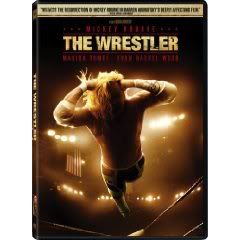The Wrestler marks Darren Aronofsky's growth as a film-maker from strange, science-fiction tinged films to films with emotional resonance in a real setting. I am a huge Aronofsky fan, loving Requiem for a Dream nearly as much as Pi, but I was underwhelmed by his last effort, The Fountain. His films are almost unbearably intense, most prominently shown in Requiem, but The Fountain abandoned his first two films' grittiness for a sleeker, polished story-line, exploring ambitious philosophical themes while failing to deliver on the emotional level. For a while, I was worried where Aronofsky's career would go, especially after seeing that he was helming a project called The Wrestler, which seemed to deviate from the subjects of his previous works. The Wrestler gets everything right. Aronofsky trades high-minded philosophical themes for a more grounded, concrete narrative. He also reestablishes the inventive camera-work that made Pi and Requiem so aesthetically stunning, shooting almost the entire film on a hand-held camera. And, lastly and most refreshingly, he reinstates the violence and shock-value of his first films, escalating the wrestling scenes to cringe-inducing bouts of brutality and decadence. However, such violence is in aid of characterization--to show the hearts behind these men in the ring, to demonstrate the toll such entertainment may take on one's body, all in the service of a loyal, loving audience. "The only place I get hurt is out there," says "The Ram" as he enters the ring towards the end of the film. Rourke, giving a breathtaking performance that should have EASILY triumphed at the Oscars (it's a travesty that he didn't win), provides us a window into the tortured soul of a man who's thrown his life away for the sake of his profession. No matter how much Ram deviates from our idealized vision of a hero, the audience never feels any animosity towards him; he screwed up, and he knows it, but he can't help it. The mirrors to Rourke's life are easily seen, making the film into some manner of Greek tragedy rather than mere drama. It is Aronofsky's presence, and a wonderfully crafted script, that sets The Wrestler above other comback portraits like Rocky; the brutality is reminiscent of Raging Bull, and the style behind the film is a marvel in itself. The Ram is equated to Christian iconography, pointed out by Marisa Tomei's stripper, in that he suffers for humanity--not only is it an effective comparison, but it gives the film more depth than the average comeback piece. The buildup of sounds is used frequently as well, to great effect, to further the window in the life of the Ram. The film is not for everyone; my sister refused to watch the wrestling scenes, because they are quite shocking. Some scenes are rather melodramatic, but effectively so, making the film a draining emotional experience (I went teary-eyed at least twice). But, it is a rewarding film if you have any interest in the craft, or wish to see the performance of a lifetime by Mickey Rourke.
